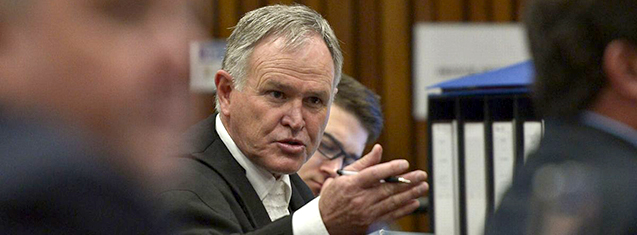 Advocate Barry Roux in action at Oscar Pistorius' trial.
Advocate Barry Roux in action at Oscar Pistorius' trial.
Photo: Supplied
The SRC Legal and Constitutional Affairs office, in conjunction with the Law Faculty, are launching the Student Court this week.
Barry Roux, the renowned South African legal representative who served as the defence advocate in the trial of Oscar Pistorius, will be the keynote speaker.
Guest speakers include Judge Lebotsang Bosieloof the South African Supreme Court of Appeal. Prof Caroline Nicholson and Prof Teuns Verschoor are to represent our Law Faculty as Dean and Lecturer, respectively.
In 2014, when Lindokuhle Ntuli occupied the Legal and Constitutional Affairs office within the Student Representative Council (SRC), the concept of this Judicial Branch of Student Governance was conceived.
“I established the Student Court because I strongly believed that we needed a student forum, beyond the University’s Disciplinary Committee,” said Lindokuhle. He added that such a forum allows for dealing with disputes between students and testing the validity of the Student Court’s constitution and the regulations of the university.
The Student Court’s aim is to administer justice according to these documents. It intervenes in decision-making matters between students, associations, or any part of the student body, at a student level. Other functions of this legal body involve regulating irresponsibly behaviour among students in order to uphold the integrity of the University of the Free State.
You are invited to the launch event:
Friday 21 August 2015
17:00
Economic and Management Sciences Auditorium (EBW), Bloemfontein Campus
For more information contact Lindokuhle Ntuli on 051 401 2082 or ntuliL@ufs.ac.za